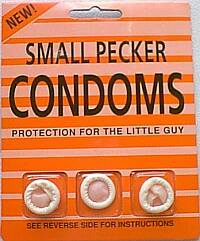

"But you cannot prevent young people from having sex. "We are not advocating that young people have sex," Norballe said.

Norballe disagreed with the idea that the new condoms would increase rates of teen sex.

"Why should we think that we would have better luck with those in grammar and middle school? "It is challenging enough to convince single adults in their 20s to use contraception consistently, even those who say they don't want to get pregnant or cause a pregnancy," he said. " think this idea might have some merit, although I question whether this plan will increase condom use in this age group, as I am not sure the main reason they are avoiding condom use is because they don't fit well," he said.Īnd Bill Albert, chief program officer of the Washington, D.C.-based advocacy group the National Campaign to Prevent Teen and Unplanned Pregnancy, expressed skepticism that providing smaller-sized condoms for this age group would solve the problem of teen pregnancy and the spread of STDs. David Greenfield, clinical director of the Healing Center in West Hartford, Conn., said the decision to market such condoms to younger users necessitates a "delicate balance" between public health and moral issues and should be approached with caution. "This approach should be adopted around the world."īut sexuality expert Dr. "Just as we vaccinate young girls against HPV, we need to arm youth with whatever means that are scientifically sound to protect their health and the health or their partners," Coleman said. Providing condoms that are comfortable and pleasurable to teens will encourage their use and, in turn, decrease rates of unintended pregnancy and disease, he said. "We know that young men are becoming sexually active as young as 14 and earlier, and we know that teen pregnancy, sexually transmitted infections and HIV are major problems around the world," said Eli Coleman, chair in Sexual Health at the University of Minnesota Medical School's Program in Human Sexuality in Minneapolis. Still, some experts said that such an approach may not be a bad idea when it comes to promoting safe sex among teens. The manufacturers do not expect that the move will be controversy-free, a point with which sexual health experts in the United States agreed. "The father of her child was 14 at the time and when asked about it, he said, 'We did use a condom, but it slipped off.' So there's been ongoing concern recently about condom sizes here." "Meanwhile, in Switzerland last year, a 13-year-old girl, Ramona, gave birth, becoming the youngest mother in the country," Norballe said. Among 13,000 respondents age 14 to 20, the magazine reported, 25 percent of the them said standard condoms were too big.

Part of the reason for the development of the new condom, she added, was a survey performed by the German magazine Bravo. "They needed a smaller-sized condom and asked us if we could manufacture it." teenagers - had trouble finding a suitably sized condom," she said. The organization "had carried out many studies which found that a lot of young people - i.e. Nysse Norballe, a spokeswoman for Swiss condom manufacturer Lamprecht AG, said the company was approached by the AIDS awareness organization AIDS-Hilfe Switzerland with the idea to produce and market a condom for a younger age group. March 8, 2010— - At first glance, the Ceylor Hotshot condom might appear similar to others in the market.īut this smaller-sized condom, thus far marketed only in Switzerland, is designed to deal with the specific problem of teenage pregnancy and the spread of disease among boys as young as 14.


 0 kommentar(er)
0 kommentar(er)
